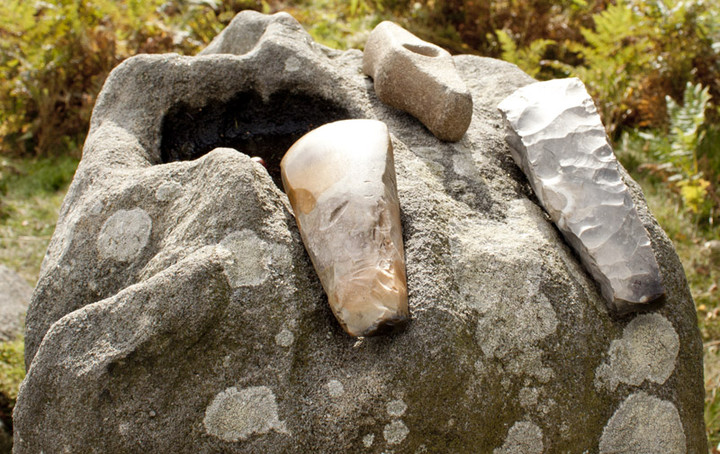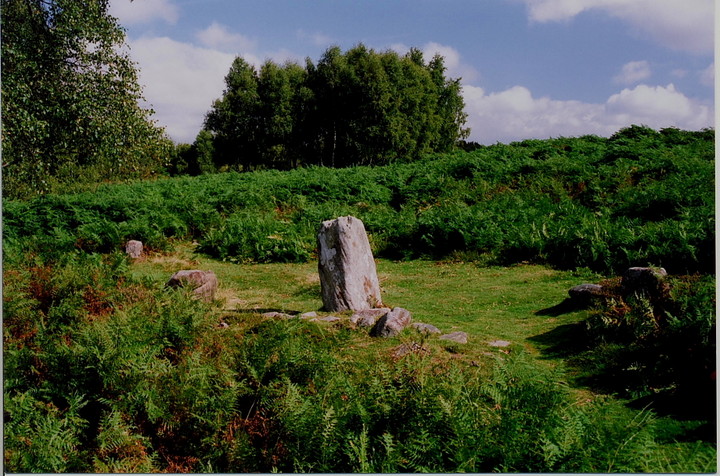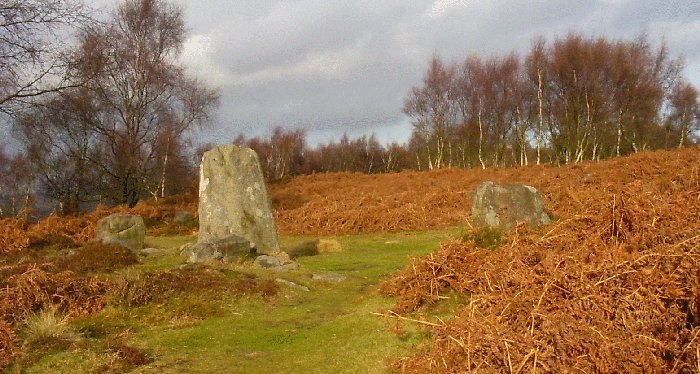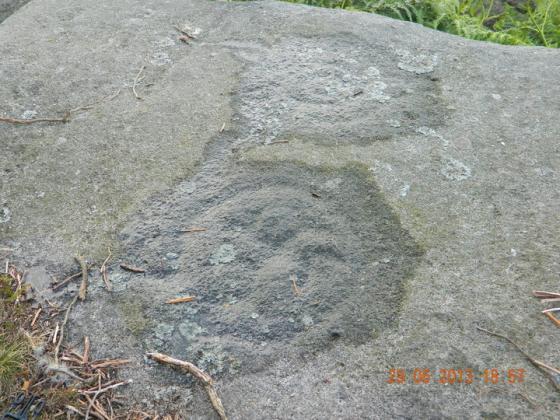
To be seen on a very pleasant autumn walk which takes you along Froggatt Edge and back via White Cliff Edge

To be seen on a very pleasant autumn walk which takes you along Froggatt Edge and back via White Cliff Edge


Nice time of year to visit this site, the bracken has died down and beautiful autumn colours everywhere

Southern arc.

The northern entrance stones, revealed after a little bracken trampling.

Many of the low stones are hidden in the dense bracken.

Somewhat meagre seasonal offerings in the hollow of the tallest stone.

Looking across the circle from the southern entrance.

Looking across the circle from the northern entrance.

This very big boulder guards the start of the path along Froggatt edge, its a minute from car to here, and ten minutes from here to stone circle.

Big stone, little stones, great circle.

Tracing the circle

Unconcerned texting teenager for scale.

The tall stone with offerings, no matter what I was if someone offered these to me I’d think they didn’t have a very high opinion of me. Strike them down.

Stoke Flat stone circle on Froggatt edge.

Couldn’t get very far up this tree.

This was the best monkey boy could attain from up a tree.

30.06.2011

30.06.2011
As mentioned by many others, this is a very calming place. The wind blowing through the silver birches nearby makes it instantly soothing.

Stoke Flat Stone Circle. Just after sunset and just before the most amazing moonrise!

Stoke Flat largest stone.
Orange Danish 4-sided point butted polished flint axe (approx 4700BC).
Grey Danish Valby type flaked thick butted axe (approx 2200BC)
Dark brown Danish Single Grave period battleaxe with retracted shafthole and concave surfaces (approx 2400BC).
A lovely site with many alignments. Enjoy.


Stoke flat atop of froggatt edge.Derbyshire.

Stoke Flat stone circle in early spring.




I love the stones

The tallest standing stone with the wreath on top, do my eyes deceive me or can anyone else discern two rings here?

facing north from southern approach

Froggatt Edge stone circle facing north from southern approach

tallest standing stone on southern end of circle





Gets pretty overgrown....

06/03. looking thru’ northern entrance.

The tallest stone in the circle

The entrance

02/02

31/12/01CE. Abbie and Mr McGrail Senior helping to define the circle.
Just away from the main track along Froggat Edge, most people seem to pass it by as they walk their dogs.
One stone, held offerings of coins in it’s upper surface, kept in place by a smaller stone.
A single rather impressive stone rises above the others marking the site from a distance. The contours of the surrounding landscape form the illusion of a circle without, when viewed from within the stone circle itself. I have noticed this phenomenon of the encircling landscape at many other ancient sites.
This circle is well worth a visit.
We visitied this stone circle on 28th August 2006. Its just off the sandy path and there were lots of people around. We stayed for nearly an hour and not one other person seemed remotely interested in this important part of our heritage.
Also, it was severely overgrown. It was actually difficult to see the circle and it was only because we had researched it that we found it.
More positive it is really beautiful, and I got very positive vibes from the whole of this unique area.
I will definately go back to this one.
Thanks to everyone who gave directions.
I visited this site on 17th April 2005 and it was very easy to find. Recent visitors had placed a wreath on top of the tallest standing stone and a penny in the hollowed out bowl on top of the same stone.
I’m not sure but I think there may actually be two rings of stone with a gap of only 1-2m between them. I’ll go back some day and have another look at this and edit this accordingly.
This is my very first posting and I hope to make more, detailed postings in future but at least it’s a start!
To get there follow the sign to Froggatt on the A623 from Calver. When you turn off the main road onto the narrow country lane that goes into Froggatt village stay on this road all the way through the village keeping the Frogatt Edge up on your right hand side. As you come out of the village turn left onto the main road and when you climb out of the wooded stretch of road there are parking spaces on the right hand side of the road. Walk back along the road towards Frogatt and there is a gate about 100 yards down from the car park on the same side of the road. Go through the gate and there is a wide path that follows Froggatt Edge. After about 1/2 mile you’ll come to a small brook and another gate, the stone circle is about another 200 yards up the path just off to the left hand side of the path. I visited in winter so all the bracken had died back and the circle was easy to spot, but I can imagine during the summer months you would have to look out for the biggest standing stone at the south end of the circle to spot it as many of the stones are probably hidden from view of the path in summer. The circle has a diameter of approximately 50 feet. The stones are set at the inner edge of a now ruined earth bank and dry stone wall. Most of the stones are less than a foot in height and there is a taller stone of about 3 1/2 feet at the southern end, that has some interesting grooves on the top that beg the question whether they have been carved out.
Access to this site is via a pleasant path along Froggat Edge. This is a very popular site with the wearers of multicoloured man-made fibres, what’s with the ski poles?
The views are beautiful but are soon to be blighted when the Stoke Wood Limestone quarry expands and gobbles up the hillside, for what? roadstone!
The circle is a beautiful ruined double ring with two entrances. Burl calles the northern entrance ‘questionable’. Stu tells me that a cairn was placed in this entrance shortly after it was constructed. I would say that it looks better than questionable and would be so bold as to say that it’s quite well defined with 4 corner stones.
A nice spot and a lovely circle
Probably missed by the copious numbers of ramblers passing this way, this unobtrusive stone circle lies about 10 metres from the main drag along the ridge. Surrounded by silver birches, in the most wonderful setting, the largest of the stones, standing about four feet tall at the southern edge of the ring had a huge weathered dip in the top, which today was full of water and reflected the blue sky.
A clear circle, well defined and peaceful, certainly worth a look and reasonably accessible for those who don’t like or can’t walk too far.
As with Wet Withens this site isn’t that impressive in it’s own right, but is made special by it’s surroundings. On this particular day the contrast between the Autumnal colours of the dead ferns and the stark white of the silver birch trees made for quite a beautiful scene. I was reminded of visits I’ve made at this time of year to the Druid’s Circle of Ulverston. Again the views from here are great, and as pointed out previously, some of the huge stones on the track leading to the circle are also worthy diversions.
6th July 2003. It was my birthday and as usual dragged along my wife and friends along for a walk. I liked this place, as no-one appeared to know it was there, indeed as was mentioned earlier, passers by looked strangely at us. My first impression was of it being a cairn, with a profusion of small rocks surrounding it.
There is an obvious path to the circle that comes off the cliff-top path at Froggat Edge
The entrance to the north was built and then blocked by a cairn. It’s thought the entrance may have been ‘symbollic’ in some kinda way.
There are traces of the wall/kerb left across this entrance.
The trees mean you have to leave the circle and move to the edge to get the best view... NW to Win Hill and the hills of the Derwent Vally beyond.
Burl says this is an 11 metre embanked circle or ring cairn, he also calls it Froggatt Edge, which is what I’ve always known it as.
As Holy says, it is bypassed by most of the walkers on the nearby track, who tend to look at you as if you are loitering with some kind of malicious intent.
People at Curbar in Derbyshireused to set bowls of cream on the hill-tops where they thought that the fairies mostly dwelt. The cream was always drunk, but the fairies were never seen.
‘Household tales with other traditional remains’ p141, by S O Addy (185).
”And back on the unchanging Flat of Stoke
Stand rugged stones in circle, whence the sun
The whole of day was seen, and where the stroke
Of sacrifice was at his rising done.
And out on Ramsley’s brackened floor,
And high on Eyam’s black barren moor,
And far o’er Offerton and all around
These olden temples stud the higher ground.”
A verse from The Pride of the Peak by Ethel Bassett Gallimore (1926)
Info & pictures by Paul & Vicky Morgan – authors of the handy and friendly ‘Rock Around the Peak’ book which handles around 36 sites in Derbyshire, many of which aren’t widely known. They seem to have contributed quite a lot of information to this website, so if you’re a local, have a scoot around. You’ll be surprised.























































































































































































































































